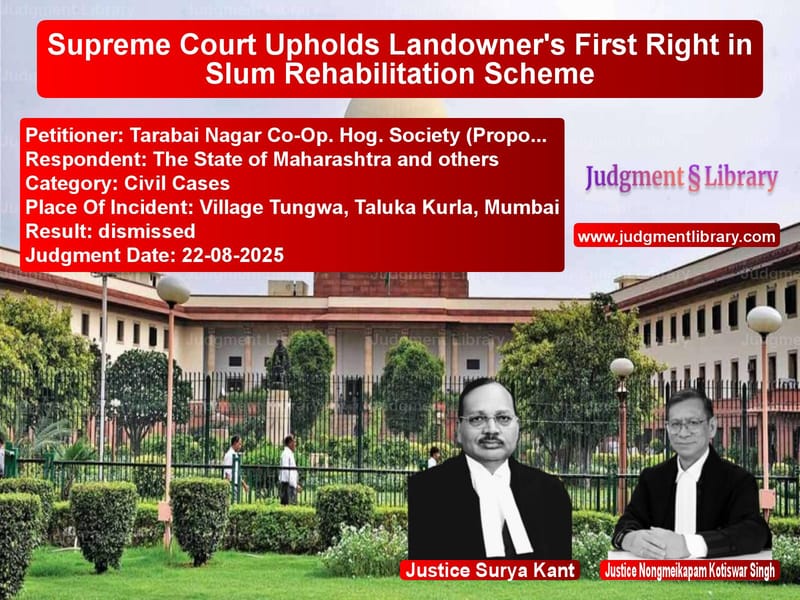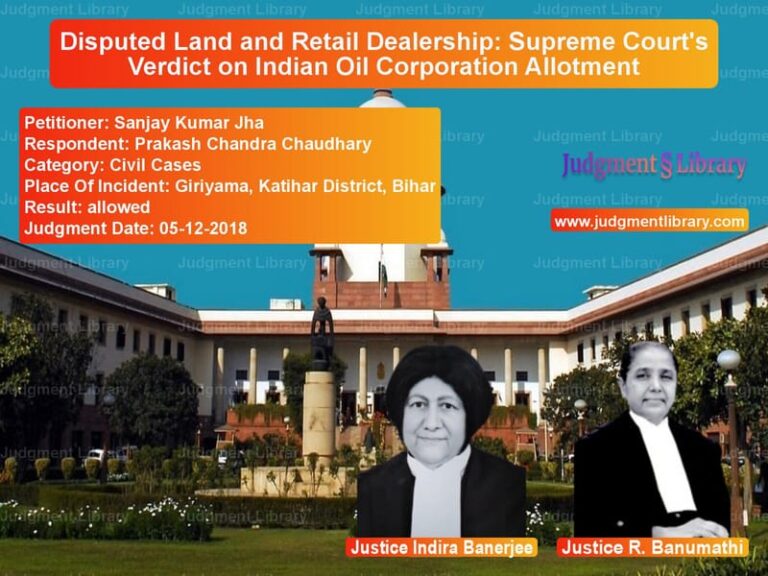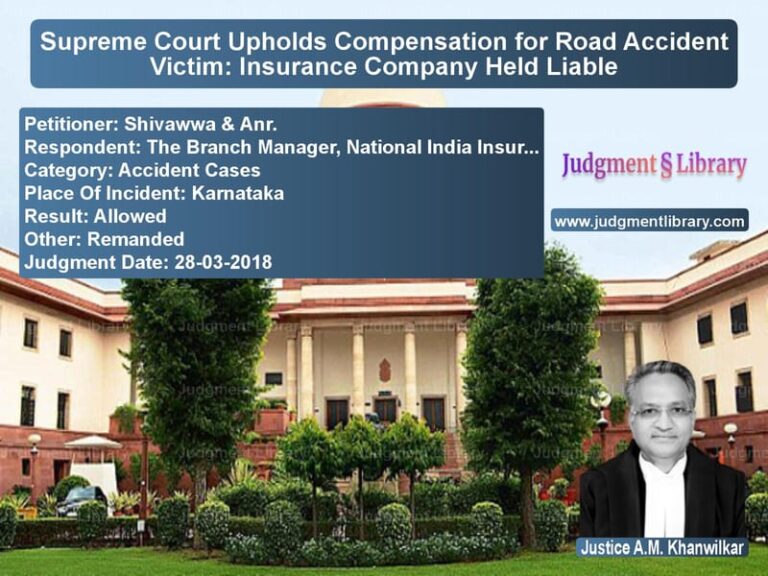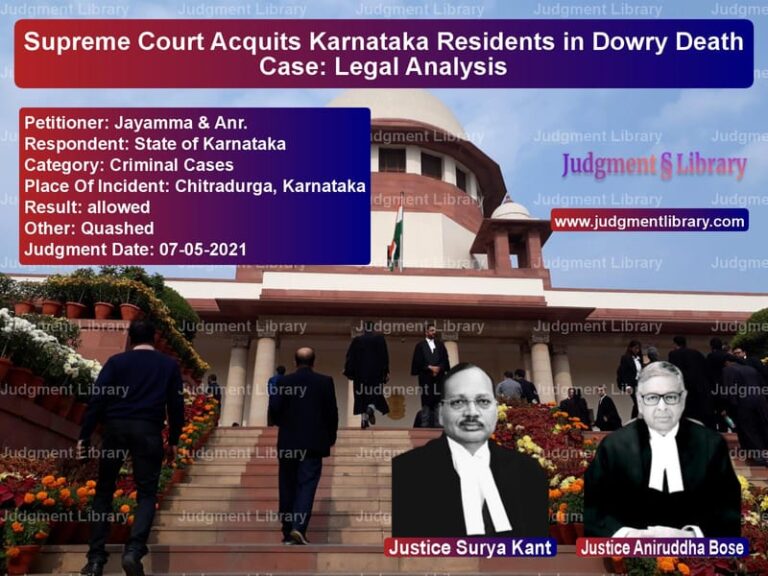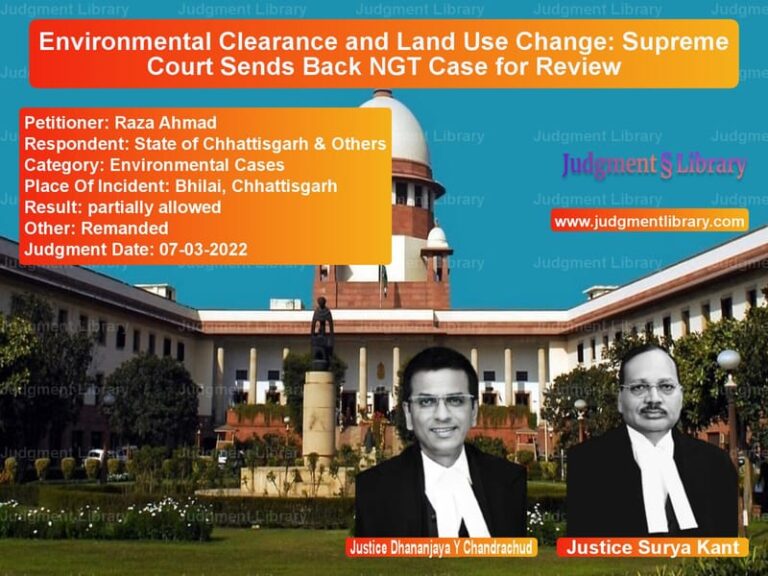Supreme Court Upholds Landowner’s First Right in Slum Rehabilitation Scheme
In a landmark judgment that clarifies the rights of property owners in slum rehabilitation projects, the Supreme Court of India has delivered a comprehensive verdict protecting landowners’ preferential rights. The case centered around a prime 9,054 square meter property in Village Tungwa, Taluka Kurla, Mumbai, owned by Indian Cork Mills Private Limited (ICM) since 1970. The legal battle began when the Slum Rehabilitation Authority (SRA) attempted to acquire this land without giving the owner an opportunity to submit its own rehabilitation scheme, leading to a complex legal dispute that ultimately reached the highest court in the country.
The controversy dates back to 1979 when a portion of ICM’s land was declared a ‘Slum Area’ under the Maharashtra Slum Areas Act. Over time, the slum expanded, and the dwellers formed the Tarabai Nagar Co-operative Housing Society. In 2011, the entire property was declared a Slum Rehabilitation Area (SR Area). What followed was a series of legal maneuvers by the Tarabai Society to have the land acquired by the government, while ICM consistently maintained its willingness to develop the property itself under the Slum Rehabilitation Scheme.
The Legal Battle Begins
The Tarabai Society, through its legal representative Mr. Shyam Diwan, vehemently contended that neither the legislative scheme of the Slums Act nor the facts of this case warranted that ICM be allowed to interfere in the redevelopment. He argued that “The High Court has incorrectly interpreted a preferential right in favour of the landowner as being implied in Section 13 of the Slums Act. The text of the provision does not indicate that the owner has the right to redevelop land over other stakeholders.” The Society maintained that ICM had been negligent for decades and had failed to submit a proper rehabilitation scheme despite numerous opportunities.
On the other side, the State of Maharashtra and SRA, represented by Mr. Shyam Mehta, focused their arguments on the legislative interpretation. They contended that “Section 13 creates equal interest and rights in favour of the ‘landholders’ and ‘occupants’. There is no preference for owners (as part of ‘landholders’) vis-à-vis the slum dwellers (occupants).” They argued that the publication of the SR Area declaration in the Official Gazette constituted adequate notice to the owner, making specific invitations unnecessary.
The Landowner’s Defense
Dr. Abhishek Manu Singhvi and Mr. Amar Dave, representing ICM, presented a compelling case for the landowner’s rights. They asserted that “The Slums Act creates a preferential right in favour of the owner to develop it. Section 3B(4)(c) and (e), as well as Section 13, showcase this inalienable right in the cases of SR Schemes.” They highlighted that the SRA’s own Circular No. 144-A explicitly stated that “the first right to file the Slum Rehabilitation scheme is of the owner of the land.”
The landowners argued that they had consistently demonstrated willingness to redevelop the property, sending multiple letters to the SRA and even reaching out to the Tarabai Society. However, they faced resistance at every turn. ICM also raised serious concerns about the motives behind the acquisition push, suggesting that “Tarabai Society is operating with a mala fide intention, aiming to grab the Subject Land at a low price to benefit a private builder, with whom they are colluding.”
Supreme Court’s Landmark Analysis
The Supreme Court bench comprising Justices Surya Kant and Nongmeikapam Kotiswar Singh delivered a thorough analysis of the legal framework and facts. The court made several crucial observations that will shape slum rehabilitation law for years to come.
On the fundamental question of whether landowners have preferential rights, the court was unequivocal: “A logical reading of Sections 3B(4)(e) and 13(1) makes it clear that the SRA’s power to undertake redevelopment can only be invoked if the owner extinguishes its right to redevelop. The owner’s right to develop an SR Area, thus, holds preference over that of the SRA within Chapter I-A of the Slums Act.”
The court rejected the argument that landowners and slum dwellers have equal rights, stating: “We are, however, unable to accept this contention. We say so because a landowner of an SR Area is not only entitled to the rights granted by the Slums Act but also enjoys some inherent rights attached to an immovable property. Ownership rights are also constitutionally protected and can only be interfered with as a result of the operation of law.”
The Notice Requirement
One of the most significant aspects of the judgment was the court’s ruling on the requirement for specific notice to landowners. The court emphasized that “It cannot be overlooked that in the absence of a prior notice, the owner may not even become aware that the Subject Land has been declared an SR Area. Unaware that it is required to submit an SR Scheme to exercise its preferential right, the owner could lose a substantial part of its rights over the land.”
The court dismissed the argument that Gazette publication constituted adequate notice, observing: “True it is that the Gazette notification or a public notice in newspapers shall be deemed to have informed an owner regarding the Section 3C(1) Declaration. It will, however, be far-fetched and preposterous to further assume that such owner is also obligated to submit a redevelopment scheme when the said notification does not invite the owner to submit any proposal.”
Interrelationship Between Acquisition and Development Rights
The court provided crucial clarity on the relationship between the government’s acquisition powers and landowners’ development rights. It held that “Rather, any process to acquire the land shall have to be kept in abeyance till such time as the owner’s preferential right to develop it stands extinguished. Since it is open to the owner to file its own SR Scheme within a reasonable time and the proposal of the owner, if valid and complete, would take primacy, it cannot be said that there is any legal necessity to acquire the land.”
The court distinguished the present case from previous judgments, noting that “When an SR Area has been notified under Section 3C(1) of Chapter I-A and its development through an SR Scheme is conceptualised, whereunder there is an inbuilt preferential right of an owner to carry out redevelopment, the power of acquisition under Section 14 would not operate in an independent silo; rather, it must derive meaning and effect from the principles prevailing throughout the legislative scheme of Chapter I-A.”
Questionable Conduct Exposed
The judgment contained strong observations about the conduct of both the Tarabai Society and the SRA. The court noted that “The answer perhaps lies in the fact that the Tarabai Society had appointed a developer, M/s Concrete Lifestyle and Infrastructures Pvt. Ltd., even before any proposals were forwarded to the SRA. This fact alone is sufficient to draw an almost irrefutable inference that the poor slum dwellers were allured by a powerful private developer, who had a vulture’s eye on the Subject Land.”
Regarding the SRA’s conduct, the court expressed serious concerns: “The conduct of the SRA is equally, if not more, troubling and warrants a closer scrutiny. Its actions reflect a pattern of shifting positions and an approach that is arbitrary and unreasonable and lacks bona fides.” The court highlighted internal communications where both the SRA and State had acknowledged the landowner’s preferential rights, yet proceeded with acquisition regardless.
Final Ruling and Directions
In its concluding remarks, the Supreme Court dismissed all appeals against the High Court’s judgment and issued clear directions: “Keeping in mind the amendment in the applicable regulations during the pendency of these Civil Appeals, liberty is granted to ICM to submit, within a period of 120 days, a fresh SR Scheme for redevelopment of the Subject Land, strictly in accordance with laws and regulations in force.”
The court also directed that “The SRA and the State shall process ICM’s proposal as expeditiously as possible under the prescribed procedure, within a period of not more than 60 days from the date of ICM’s submission.”
This judgment represents a significant victory for property rights in urban redevelopment projects. It establishes clear principles that protect landowners from arbitrary acquisition while balancing the needs of slum dwellers for rehabilitation. The ruling emphasizes that due process must be followed, and landowners must be given a genuine opportunity to exercise their development rights before the government can resort to acquisition. The decision is likely to have far-reaching implications for slum rehabilitation projects across Maharashtra and potentially other states with similar legislation.
Petitioner Name: Tarabai Nagar Co-Op. Hog. Society (Proposed).Respondent Name: The State of Maharashtra and others.Judgment By: Justice Surya Kant, Justice Nongmeikapam Kotiswar Singh.Place Of Incident: Village Tungwa, Taluka Kurla, Mumbai.Judgment Date: 22-08-2025.Result: dismissed.
Don’t miss out on the full details! Download the complete judgment in PDF format below and gain valuable insights instantly!
Download Judgment: tarabai-nagar-co-op.-vs-the-state-of-maharas-supreme-court-of-india-judgment-dated-22-08-2025.pdf
Directly Download Judgment: Directly download this Judgment
See all petitions in Property Disputes
See all petitions in Landlord-Tenant Disputes
See all petitions in Damages and Compensation
See all petitions in Consumer Rights
See all petitions in Contract Disputes
See all petitions in Judgment by Surya Kant
See all petitions in Judgment by N. Kotiswar Singh
See all petitions in dismissed
See all petitions in supreme court of India judgments August 2025
See all petitions in 2025 judgments
See all posts in Civil Cases Category
See all allowed petitions in Civil Cases Category
See all Dismissed petitions in Civil Cases Category
See all partially allowed petitions in Civil Cases Category

